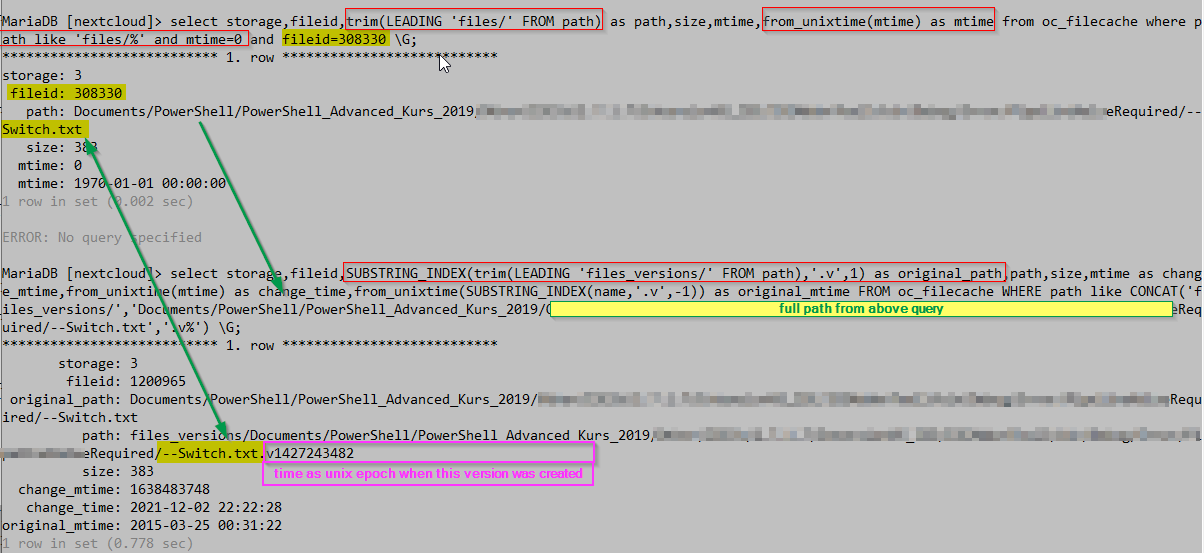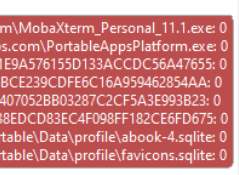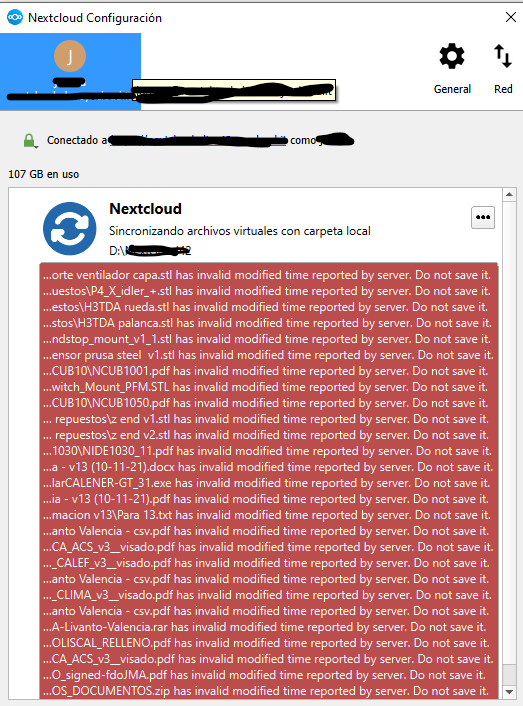Perhaps you can create a specific new user and run the tests for this user first. Not sure about the reproduction step, if you need some data first, etc. But if it is a new user with some random data, you can clean that afterwards more easily. Ideally, you test with the 3.4.0 version first, if you have the error and that for the new user it is gone in 3.4.1.
I absolutely agree and I’m aware of the possible steps to repro the issue.. one could start with a virtual machine and NC instance without production files, check if the problem exists, go a step further to a fake user on your production instance with your production client and finally end with your production user and production data:
each additional step you add to improve security and avoid data loss cost you time and resources and if the problem strikes at very last stage when you trust the update and test on your production data you end on in the same situation - hours of recovery work - additionally to all the testing before..
chances exist you find the issue running all the dry tests with fake user/fake data before you touch the production data - but the question who is willing to spend days of his spare time (and at same time is well trained to understand and document the tests in a good way)..
and Nextcloud could run all this dry run tests on their own (hopefully they do).. Nextcloud already has to run this tests for their paying customers.. I feel little unfair they offload this time-consuming, dirty work to the community, without providing good support and recovery options..
In the other discussion, about another legal entity, Jos and others always talked about money and resources - this is exactly the right discussion - I’m glad to give away a portion of my time and expertise for the community but I’m not willing to work as full time test engineer without reasonable return..
@jospoortvliet I’m ready to talk about a deal - I spent my time for comprehensive testing in exchange to “credits” I can choose features/bugs/improvements I would like to push from my side. We definitely can negotiate good quota of my time vs. NC time..
You asked how to avoid to spend 3h of restoring data. And just taking a fake user on your productive setup (and perhaps your local system), does it take 30 min? Not hours. You are not supposed to do full testing and you don’t need to set up x virtual machines. You just want an idea how your productive user might react with a fair chance.
What about the people spending their time helping other users, working on the documentation, translation etc.?
For certain bugs there is a monetary compensation if you report them via hackerone.
I do it as well!
If would be looking for money I would not spend my time here…
no it is not true. The condition triggering the bug must be somehow ambiguous and might only happen with production user and reasonable amount of data otherwise this would be a shame such a serious bug passed QA.
little testing under lab conditions doesn’t help in this situation - the test with fake user/data without hitting the problem shows absolutely nothing: the bug might still exist it is simply not triggered in this specific setup… only in case you are lucky and the problem occurs in your lab setup you get advantage from the test… otherwise it’s complete waste of time. to become confident the problem is fixed you must exactly reproduce the the setup you hit the issue before (even this doesn’t provide 100% guarantee)…
My main goal is to change the focus on how we can help people who still experience the issue or might hit it later (maybe during testing) to recover from the problem.
I had no resync effect wit the 3.4er version. Is there any short way to recognize if the issue occurs in my environment with 3.4.1?
I mean searching logs for specific entries; checking attribute of files on the serverside.
It doesn’t happen to everyone, clearly. I don’t really know why - I’m not really technical enough and I don’t know exactly what the cause of the problem was. The issues we’ve seen on our server (0 byte files and wrong modification dates, like, 50 years in the past) are not so hard to find, though.
Another update which should fix the problems with weird dates:
🪟 Windows: https://cloud.nextcloud.com/s/b6wdJktaP9PtnHN
 Linux: https://cloud.nextcloud.com/s/WH6LmjDoxaYW6by
Linux: https://cloud.nextcloud.com/s/WH6LmjDoxaYW6by
 Mac OS X: Nextcloud
Mac OS X: Nextcloud
Hello
the method I have used is far from perfect.
I did query the database to get all files with invalid dates.
mysql <database name>
select path from oc_filecache where mtime <= 0;
from this I generated a script to put valid dates (but not from backup due to me wanting to be quick)
touch -c <filename reported by the query>
the hard thing is that path returned by the first query is missing the path to storage and I do not have an easy way to solve that
at the end I just trigger a scan of the files to update again the database
sudo -u www-data php <path to nextcloud>/occ files:scan
thank you @mgallien for this starting point. As long I understand right you reset the invalid time stamp of the the file to now… I was looking for more complex approach like restoring versions and recover the original file date
I would try to script something over the weekend - could you help me and explain where in the DB the information about file versions is stored and how the original file and it’s versions are linked together? Is there some docs about database schema available, I didn’t found anything…
Regarding the storage path, in oc_filecache there is a column storage which shows the numeric_id from oc_strorages table - both pieces allow can be combined to build full path
I didn’t have serious disruption on 3.4.0, but I did have several folders resync, when they were already up to date. This has not recurred on 3.4.1RC1, for either of the two builds posted. All run on Win10 Enterprise 2004.
I did not have any issues on 3.4.0 with server 21.0.7 without virtual files, and i do not have any with … Nextcloud-bugfix-3.4.1RC1-build-8524-unbranded.AppImage
I tryed hard to find a universal solution to link the file damaged by the sync with valid versions and allow subsequent recovery… at the moment my sql skills only allow this summary of intermediate steps which hopefully helps others. for some really strange reason there is no clear relation (in terms of unique ID) between the files and their versions… both are listed in the oc_filecache table… the only difference is
-
real files have prefix
files/ - while versions have
files_versions/prefix and.v<unixepoch>suffix in the path column
so in my eyes the only way to detect a file and it’s version belong together is to strip files/ prefix and search for records with prefix files_versions/ and same value at the end (and strip the suffix after .v).
here I explain the procedure with one file I found with the search term @mgallien provided:

# relevant data from oc_filecache for files with invalid mtime
select storage,fileid,trim(LEADING 'files/' FROM path) as path,size,mtime,from_unixtime(mtime) as mtime from oc_filecache WHERE path like 'files/%' and mtime=0 and fileid=308330 \G;
this query shows one file with the id 308330 - skip the and fileid.. to see all files with invalid mtime and skip \G to see the results as table… some hints:
- trim(LEADING ‘files/’ FROM path)
shows the path of the original file without files/ prefix - from_unixtime(mtime) as mtime
converts unix epoch to human readable time - path like ‘files/%’ and mtime=0
lists regular files with invalid change time - and fileid=308330
limits results to one specific file - \G
makes results appear as list rather than table
# file version for specific file path collectected from above query
select storage,fileid,SUBSTRING_INDEX(trim(LEADING 'files_versions/' FROM path),'.v',1) as original_path,path,size,mtime as change_mtime,from_unixtime(mtime) as change_time,from_unixtime(SUBSTRING_INDEX(name,'.v',-1)) as original_mtime FROM oc_filecache WHERE path like CONCAT('files_versions/','Documents/PowerShell/PowerShell_Advanced_Kurs_2019/...eRequired/--Switch.txt','.v%') \G;
- SUBSTRING_INDEX(trim(LEADING ‘files_versions/’ FROM path),’.v’,1) as original_path
shows the raw value of path (exactly the same as path in the above query - from_unixtime(SUBSTRING_INDEX(name,’.v’,-1)) as original_mtime
the suffix of thepathvalue shows when this file version was created (mtime of the original file) - WHERE path like CONCAT(‘files_versions/’,‘Documents/PowerShell/PowerShell_Advanced_Kurs_2019/…eRequired/–Switch.txt’,’.v%’)
filters the table for filename from the above query but prepernds thefiles_versions/prefix and.v...suffix - in my case there is only one version but depending on how long desktop client 3.4.0 was syncing you might have multiple. I used CONCAT so you can directly feed path from the above query as middle parameter
At the moment my SQL skills are not enough to construct recovery action from this findings which is valid for different architectures but with this starting point it’s not hard script something using your preferred scripting/programming tool something which
- builds the list of affected files using the first query
- repeats the second query using the file paths from the first result as input and
– collects a list of existing file versions - depending on your approach and skills
– either extract correct modification dates from the versions and change the creation/modification date on the files
– or move the version you like to the original location and recover by rinningocc files:scan
I’m not sure if I should report results from 3.4.1 RC here on in the Github issue? (https://github.com/nextcloud/desktop/issues/4016)
I’m using 3.4.1 RC for a few days, and I meet a problem today. I see a lot of these error messages:
XXXXXX\file.xlsx has invalid modified time reported by server. Do not save it.
Testing related problems are best to be reported directly to the bug tracker.
Installed 3.4.1 from github and run into the issue. Unfortunately, the files were deleted from Nextcloud. No data loss, since backup was available.

Hi, macOS user here (12.1) and nextcloud 3.4.1
I get errors like:
xxx has invalid modified time reported by server. Do not save it.
On the server, all the affected files are shown as created Jan 1 1970
me too…
Get Nexcloud client 3.4.1 and that is what i get:

@jospoortvliet it’s a shame 20d after the issue was identified there is no guidance from Nextcloud GmbH how to recover from the issue… it might be no small issue to restore a private instance, but what is about small business? with 10 users, 2-3 of them affected by the issue? how should they respond to the problem?
I feel really bad customers left alone with the problem… and the only official person participating this thread is a marketing guy… kudos for @jospoortvliet and really bad mood against tech personnel who prefer to keep hidden behind the “forum firewall”
For a possible fix take a look at the following wiki page:
Hi Mathieu,
I tried your shell script and I got a lot of errors from mysql query. Because some directories have single quote in name.
Moreover, the script only browses some files of the first user, it doesn’t go to the second one nor to the groupfolders.
Output error:
ERROR 1064 (42000) at line 1: You have an error in your SQL syntax; check the manual that corresponds to your MariaDB server version for the right syntax to use near ‘écran/iOS-14.2-wallpaper-LAke-The-Cliff-Light-Mode.jpg’’ at line 2